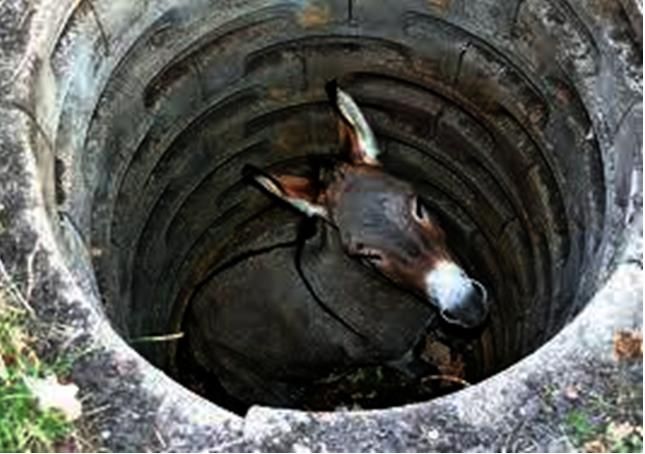A good way to live without becoming an old jackass.
Found this (recycled)
wonderful message on facebook. It's especially poignant for the
upcoming (mostly commercial and capitalistic) holidays. Please
share and pass it around. Thanks! thinkingblue

One day a farmer's donkey fell down into a
well. The animal cried piteously for hours as the farmer tried to
figure out what to do. Finally, he decided the animal was old,
and the well needed to be covered up anyway; it just wasn't worth
it to retrieve the donkey.
He invited all his neighbors to come over and help him. They all grabbed a shovel and began to shovel dirt into the well. At first, the donkey realized what was happening and cried horribly. Then, to everyone's amazement he quieted down.
A few shovel loads later, the farmer finally looked down the well. He was astonished at what he saw. With each shovel of dirt that hit his back, the donkey was doing something amazing. He would shake it off and take a step up.
As the farmer's neighbors continued to shovel dirt on top of the animal, he would shake it off and take a step up. Pretty soon, everyone was amazed as the donkey stepped up over the edge of the well and happily trotted off!
MORAL :
Life is going to shovel dirt on you, all kinds of dirt. The trick to getting out of the well is to shake it off and take a step up. Each of our troubles is a steppingstone. We can get out of the deepest wells just by not stopping, never giving up! Shake it off and take a step up.
He invited all his neighbors to come over and help him. They all grabbed a shovel and began to shovel dirt into the well. At first, the donkey realized what was happening and cried horribly. Then, to everyone's amazement he quieted down.
A few shovel loads later, the farmer finally looked down the well. He was astonished at what he saw. With each shovel of dirt that hit his back, the donkey was doing something amazing. He would shake it off and take a step up.
As the farmer's neighbors continued to shovel dirt on top of the animal, he would shake it off and take a step up. Pretty soon, everyone was amazed as the donkey stepped up over the edge of the well and happily trotted off!
MORAL :
Life is going to shovel dirt on you, all kinds of dirt. The trick to getting out of the well is to shake it off and take a step up. Each of our troubles is a steppingstone. We can get out of the deepest wells just by not stopping, never giving up! Shake it off and take a step up.
Remember
the five simple rules to be happy:
1. Free your heart from hatred - Forgive.
2. Free your mind from worries - Most never happens.
3. Live simply and appreciate what you have.
4. Give more.
5. Expect less from people but more from yourself.
You have two choices... smile and close this page,
or LIKE this and pass it along to someone else to SHARE the lesson.
1. Free your heart from hatred - Forgive.
2. Free your mind from worries - Most never happens.
3. Live simply and appreciate what you have.
4. Give more.
5. Expect less from people but more from yourself.
You have two choices... smile and close this page,
or LIKE this and pass it along to someone else to SHARE the lesson.
___
CAPITALISM: A Word Story
It is easy to forget that capitalism was coined not so long ago, in the mid-19th century, when the Industrial Revolution was in full swing, and individual entrepreneurs were creating new industries and amassing wealth. Terms for the other two major competing economic systems of the past two centuries— socialism and communism—were also coined around the same time. Also, about the same time it became common to designate all such coinages as “isms”: terms formed by adding the suffix -ism to a root word in order to expand its meaning to encompass a related system, theory, or practice. Thus from a fairly old word, capital, the relatively newer word, capitalism, was formed to describe the then emerging economies of the West. (Another towering ism coined later in the 19th century was, of course, Darwinism. )
On the surface, the meaning of capitalism seems straightforward; referring to an economic system in which private individuals, rather than governments, own property and businesses. But beneath the surface, strong currents of opinion and theory swirl about the term. Many people fiercely espouse capitalism as an economic freedom inseparable from democracy, as reflected in several books considered classics and still avidly read today: for example, Capitalism and Freedom by Nobel laureate Milton Friedman (first published in 1962), and Capitalism, Socialism and Democracy by Joseph A. Schumpeter (first published in 1943). So it may be a challenge to use the term without triggering a discussion of its broader political context.







<< Home